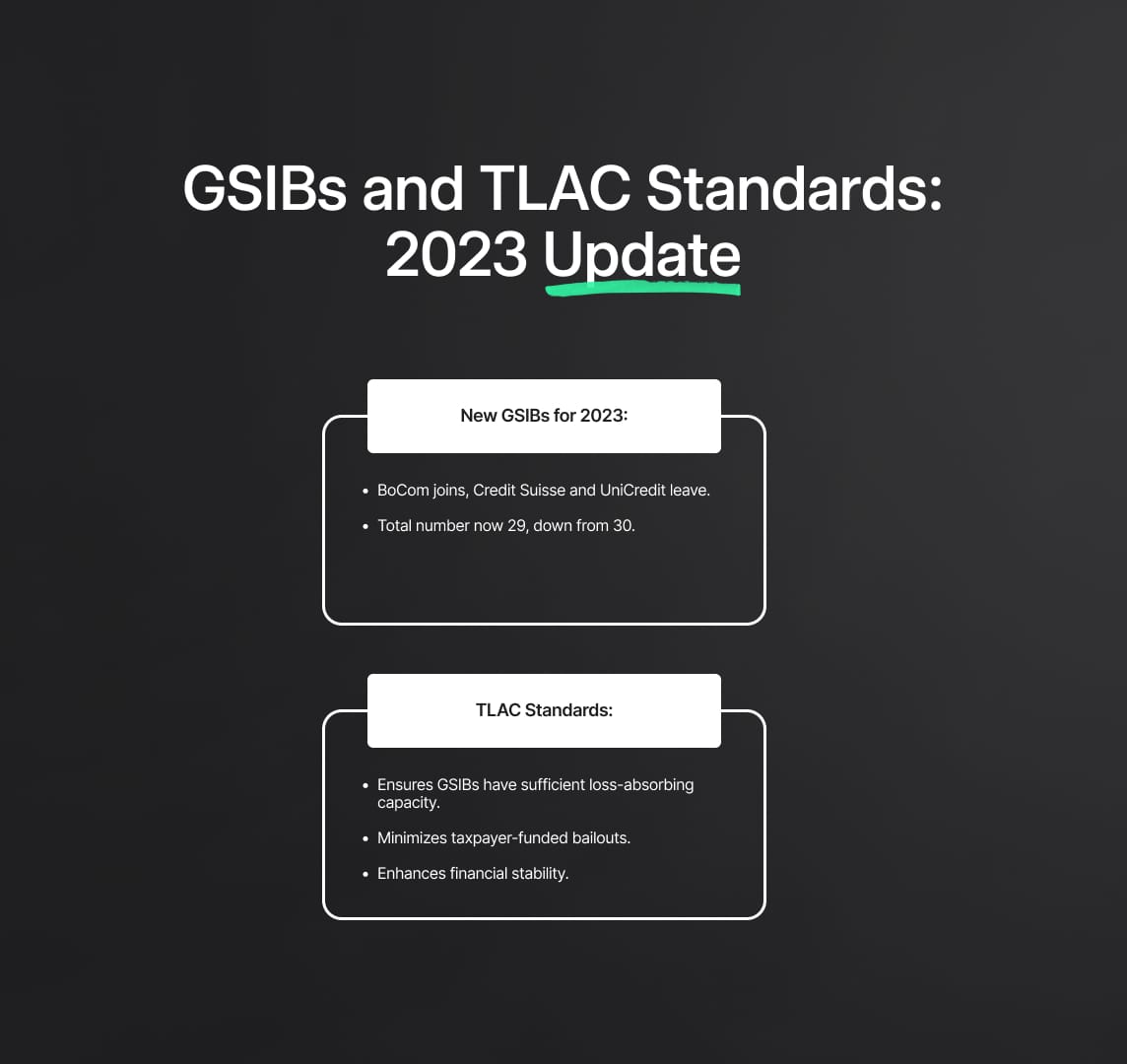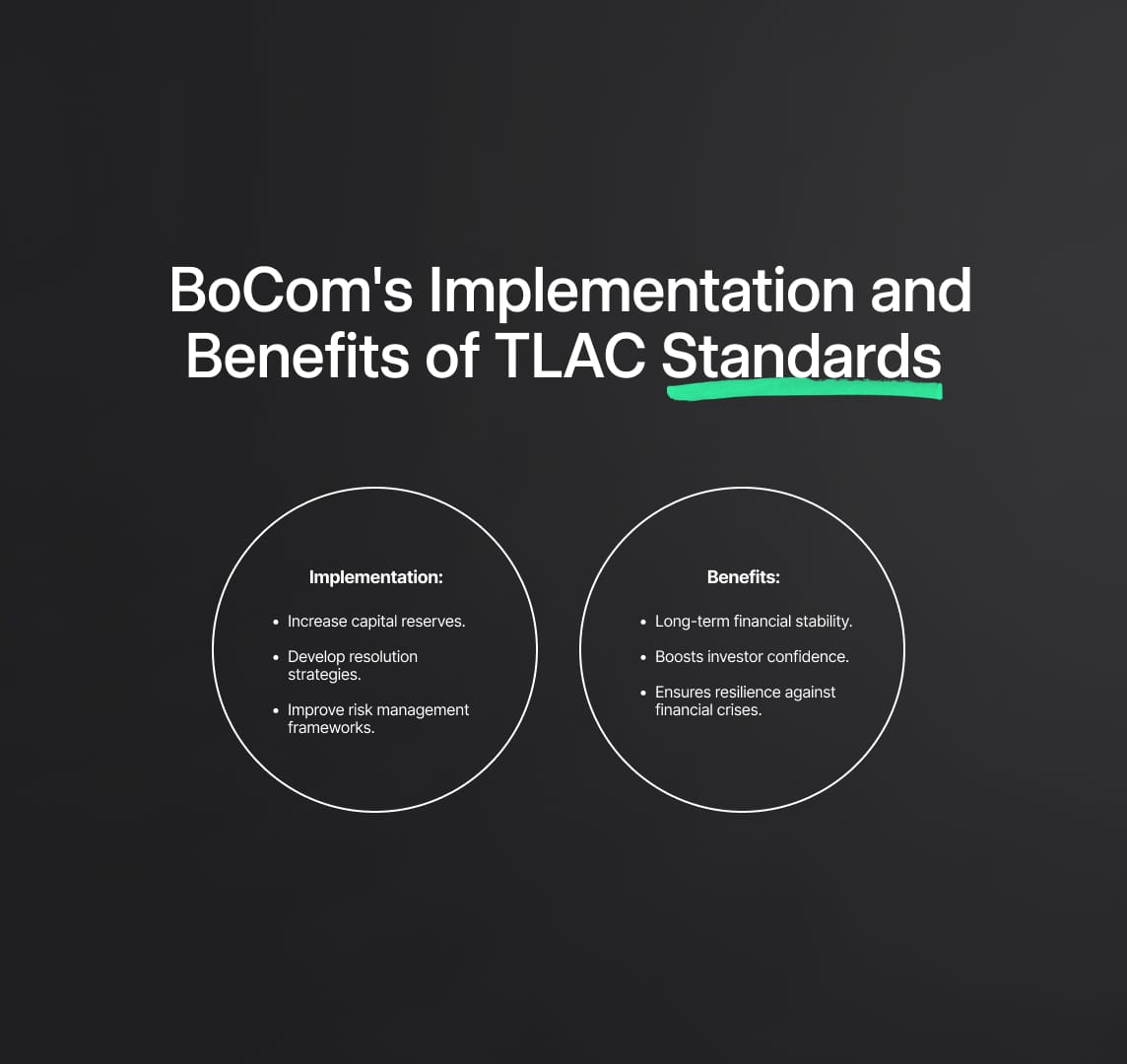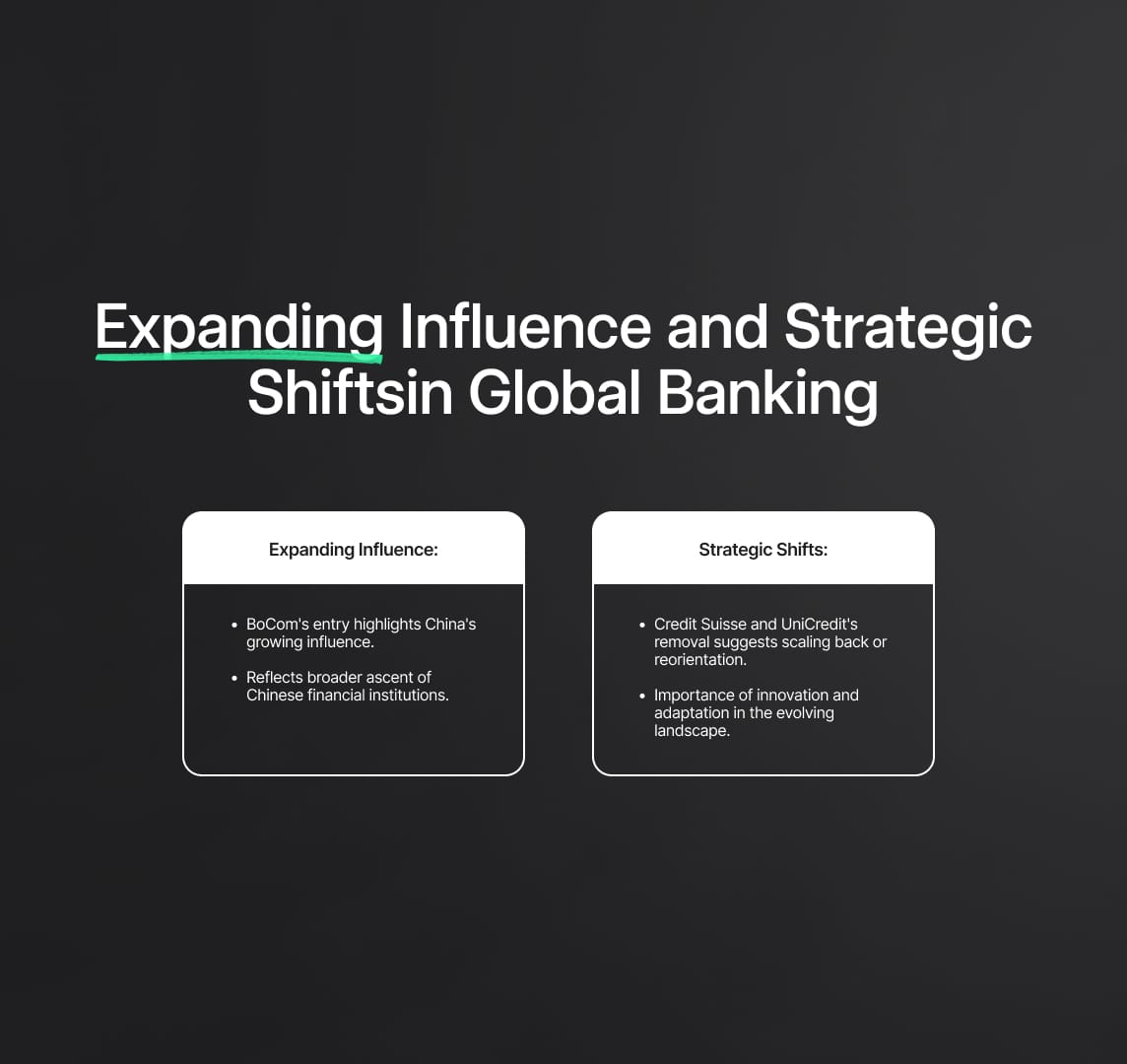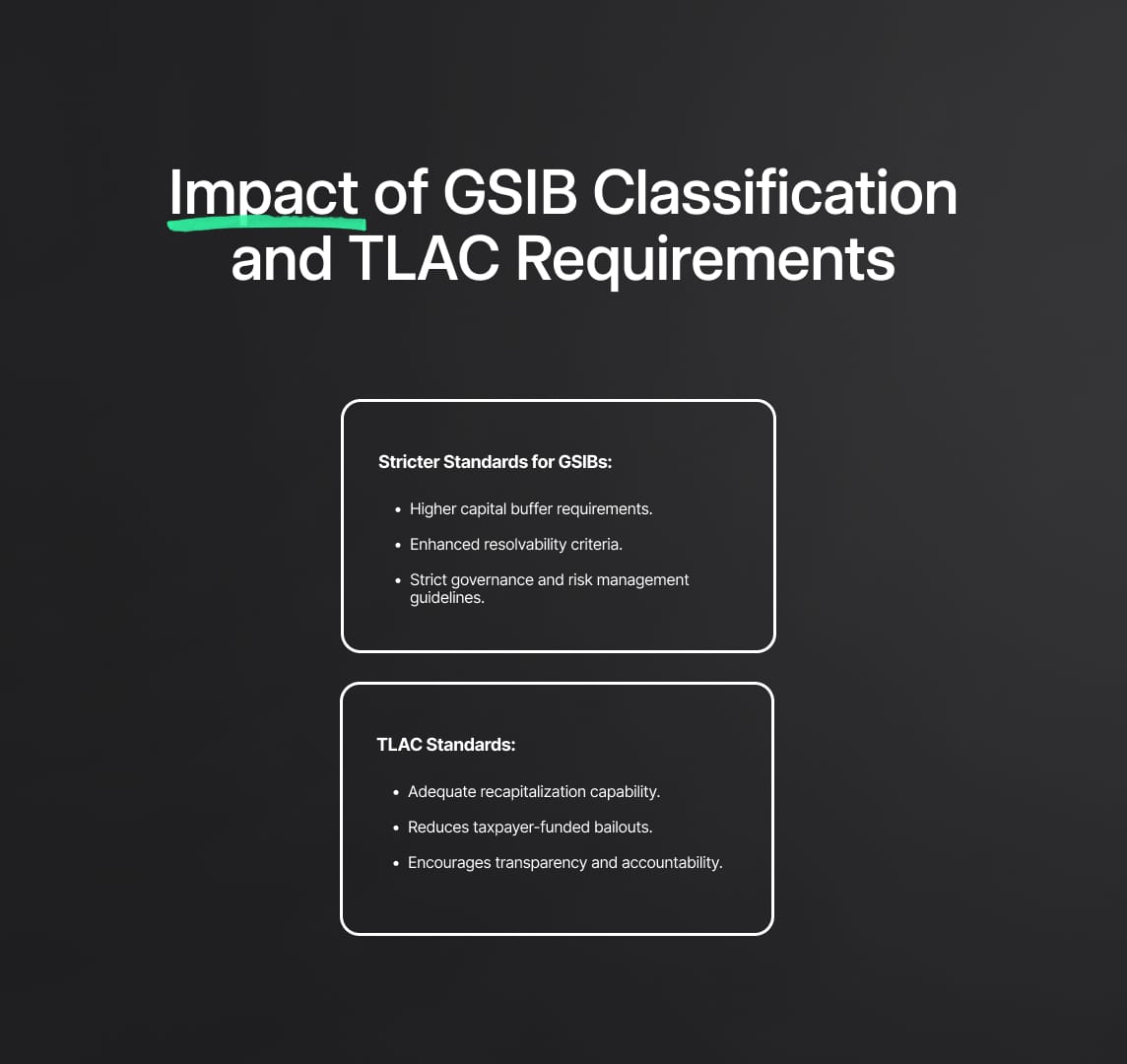Global Systemically Important Banks (GSIBs): TLAC Standards
The 2023 update on Global Systemically Important Banks (GSIBs) highlights shifts in the banking sector, focusing on the impact of Total Loss-Absorbing Capacity (TLAC) Standards and regulatory compliance.

Bank of Communications Joins FSB's 2023 List of Global Systemically Important Banks
The global banking sector has undergone a substantial transformation with the Financial Stability Board's (FSB) recent update of the list of Global Systemically Important Banks (GSIBs) for 2023. Notably, two significant businesses, Credit Suisse and UniCredit, left while Bank of Communications (BoCom) joined this year's list, which is a crucial benchmark for the banking industry. The number of recognized GSIBs has decreased from 30 to 29 as a result of this transition, indicating a dynamic shift in the global financial power balance.
- Rigorous Assessment Methodology by BCBS
- Complete data through the end of 2022 is needed to compile the GSIB list.
- A stringent evaluation process has been developed by the Basel Committee on Banking Supervision (BCBS) to identify banks whose failure could cause a disruption in the global financial system and require increased regulatory control.
- Implications for GSIBs: Stricter Standards and TLAC Requirements
- GSIBs must comply with stricter regulations, which include higher capital buffer requirements.
- In order to minimize the possibility of taxpayer-funded bailouts in the event of failure, the Total Loss-Absorbing capability (TLAC) criteria are essential in ensuring that GSIBs have adequate loss-absorbing and recapitalization capability.
- Enhanced Resolvability Requirements
- In order to reduce the impact on financial stability, GSIBs are subject to heightened resolvability criteria, which call for credible plans for an orderly resolution in the event of collapse.
- Raising the bar for supervisors means enforcing strict governance and risk management guidelines that encourage openness and responsibility.
- Significance for Bank of Communications (BoCom)
- BoCom's listing on the GSIB list is a significant achievement that highlights the bank's systemic significance within the financial ecosystem and demonstrates its expanding worldwide influence.
- BoCom's reputation will likely be improved by this acknowledgment, which could lead to opportunities for growth and expansion in the global banking industry.
- Overall Reflections on FSB's 2023 GSIB List
- The update underscores the evolving nature of the global financial system.
- It highlights the crucial role of regulatory frameworks like TLAC in maintaining financial stability.
- The dynamic nature of global banking is evident, with institutions needing continuous adaptation to changing regulatory landscapes and market conditions.
The FSB's 2023 GSIB list reflects a transformative phase in the global financial sector, emphasizing the importance of robust regulatory measures and adaptability for institutions to thrive amidst evolving conditions.
2023 Update on Global Systemically Important Banks (GSIBs)
The 2023 Update on Global Systemically Important Banks (GSIBs), released by the Financial Stability Board (FSB), is a pivotal event reshaping the financial landscape. This update, crucial in understanding the international banking hierarchy, spotlights the entrance of Bank of Communications (BoCom) and the departure of longstanding members Credit Suisse and UniCredit. Importantly, the revision underscores shifts in the global banking dynamics, emphasizing the significance of Total Loss Absorbing Capacity (TLAC) in the context of Global Systemically Important Banks (GSIBs).
- Impactful Changes in GSIB Count
- The revision reduces the total count of GSIBs from 30 to 29, underscoring the fluid and evolving dynamics of global financial power.
- This alteration reflects the adaptability of the financial sector and showcases the ever-changing landscape of international banking.
- GSIB List: A Crucial Global Financial Tool
- The GSIB list serves as a critical tool in the global financial sector, identifying banks whose potential failure could pose substantial risks to the worldwide economy.
- This dynamic update sheds light on shifts in economic strengths and weaknesses across countries, emphasizing the continuous need for monitoring and assessment of the global banking system.
The FSB's 2023 GSIB list update marks more than just a numerical adjustment; it signifies a broader transformation in the international banking scene, emphasizing the importance of vigilance and adaptability in navigating the ever-evolving dynamics of the global financial landscape

Bank of Communications' Entry into the GSIB List
The recent inclusion of the Bank of Communications (BoCom) in the Global Systemically Important Banks (GSIB) list signifies a significant milestone in its growth trajectory, recognizing its expanding influence and systemic importance in the global banking sector. This acknowledgment extends beyond BoCom's sheer size and international presence; it underscores its interconnectedness in the global financial network and the potential impact it could wield in times of distress.
- Strategic Milestone for BoCom: Global Recognition
- Inclusion in the GSIB list represents a milestone, acknowledging BoCom's growing influence and systemic importance globally.
- This recognition is not just a testament to BoCom's size but emphasizes its role in the interconnected global financial network.
- Reputation Enhancement and Stability Signal
- BoCom's new GSIB status is poised to enhance its reputation in the international financial market.
- It serves as a signal to investors and stakeholders worldwide, attesting to the bank's robustness and stability amid the evolving dynamics of the global financial landscape.
- Responsibilities and Regulatory Scrutiny
- GSIB classification entails increased responsibilities and heightened regulatory scrutiny, particularly under the Total Loss-Absorbing Capacity (TLAC) Standards.
- TLAC standards are crucial for ensuring GSIBs maintain sufficient loss-absorbing capacity, reducing the risk of taxpayer-funded bailouts during financial stress.
- Higher Capital Requirements and Rigorous Strategies
- BoCom must adhere to higher capital requirements, strategically aligning itself with TLAC standards.
- Rigorous risk management and resolution strategies become imperative, ensuring BoCom is well-prepared to navigate financial challenges while contributing to the overall stability of the global financial system.
BoCom's journey as a GSIB reflects not only its individual growth but also its role as a key player in maintaining the stability of the global financial system. As it embraces the responsibilities that come with this status, BoCom positions itself as a resilient and crucial contributor to the evolving landscape of international banking.
Impact of TLAC Standards on GSIBs
The Total Loss-Absorbing Capacity (TLAC) Standards are a cornerstone of regulatory measures aimed at strengthening the resilience of Global Systemically Important Banks (GSIBs). These standards serve several critical functions:
- Ensuring Higher Capital Reserves: GSIBs are required to maintain a higher level of capital reserves. This is essential for cushioning against potential financial shocks and maintaining stability in the global financial system.
- Preparation for Orderly Resolution: In the event of financial distress, GSIBs must have credible plans for orderly resolution. This minimizes the impact on the global economy and financial markets, avoiding chaotic collapses.
- Enhancing Risk Management: Adhering to TLAC Standards necessitates a robust risk management framework. This includes identifying, assessing, and mitigating financial risks effectively.
For Bank of Communications (BoCom), as a newly designated GSIB, the implementation of TLAC Standards involves several key changes:
- Building Capital Buffers: BoCom will need to increase its capital reserves to meet the heightened requirements. This involves adjusting financial strategies to allocate more resources towards capital reserves.
- Developing Resolution Strategies: Creating a comprehensive plan for orderly resolution in case of financial distress is essential. This includes identifying potential risks and planning for scenarios to avoid systemic impacts.
- Improving Risk Management Frameworks: BoCom will need to enhance its risk management practices, incorporating more stringent controls and oversight mechanisms.
While these changes may lead to increased operational costs for BoCom, they are crucial for:
- Long-term Stability: By adhering to these standards, BoCom can ensure its stability and resilience against financial crises.
- Boosting Investor Confidence: Compliance with TLAC Standards can enhance investor trust in BoCom’s financial health and its capability to manage systemic risks.
In summary, the TLAC Standards play a pivotal role in enhancing the stability and resilience of GSIBs like BoCom. While they present challenges in terms of increased operational costs and the need for more robust risk management strategies, their long-term benefits in ensuring financial stability and boosting investor confidence are invaluable.

Expanding Global Influence of Chinese Banks in GSIBs
The recent inclusion of Bank of Communications (BoCom), a major Chinese bank, in the Global Systemically Important Banks (GSIBs) list signifies a pivotal moment in China's expanding role within the international financial landscape. This development not only represents a milestone for BoCom but stands as a symbol of the broader ascent of Chinese financial institutions onto the global stage. As Chinese banks continue to grow in size and influence, their presence in prestigious lists like GSIBs serves as a clear indicator of the shifting dynamics in the global banking arena.
- Broader Implications for Global Banking
- BoCom's inclusion signals China's increasing influence in the international financial arena, redefining the dynamics of global banking.
- This development is not isolated to BoCom alone but symbolizes the growing impact of Chinese financial institutions globally.
- Competition Intensification in Global Banking
- The growing presence of Chinese banks in GSIBs intensifies competition in the global banking sector.
- Established global banks are prompted to reassess their strategies, fostering innovation to maintain their competitive edge in this evolving landscape.
- Strategic Responses of Global Banks
- Established banks may need to invest more in technological advancements to stay ahead in the competitive landscape.
- Expanding into new markets and fortifying risk management practices become imperative strategies for maintaining competitiveness.
- Catalyst for Innovation and Adaptation
- The increasing influence of Chinese banks acts as a catalyst for innovation and adaptation in the global financial system.
- Banks worldwide are encouraged to continually evolve, improve their offerings, and embrace change to align with the transforming dynamics of the industry.
In conclusion, China's growing prominence in GSIBs not only signifies a transformative shift but also propels the global banking sector towards heightened competition, innovation, and strategic adaptation. The influence of Chinese banks serves as a driving force, compelling banks worldwide to embrace change and enhance their capabilities to thrive in this dynamic and evolving financial landscape.

Strategic Shifts in Global Banking Following GSIB Updates
The removal of Credit Suisse and UniCredit from the GSIB list marks a significant development with potential repercussions for the global banking landscape. This alteration hints at a strategic shift for these institutions, suggesting a possible scaling back of international operations or a reorientation of business models. With their exit from the GSIB list, Credit Suisse and UniCredit may face less stringent regulatory requirements, offering potential flexibility in operational strategies.
However, this change prompts crucial questions about their future growth trajectories and global market presence. It signals a necessity for these banks to reevaluate their business models and strategic priorities, adapting to the evolving dynamics of the global financial system. The shift may lead them to concentrate more on regional markets or specific banking services where they possess competitive advantages. Moreover, exploring innovative ways to diversify services becomes imperative for these banks to remain relevant and competitive in the ever-changing financial landscape.
Future Outlook for GSIBs and Regulatory Compliance
The evolving landscape of Global Systemically Important Banks (GSIBs) highlights the indispensable role of stringent regulatory frameworks, such as the Total Loss-Absorbing Capacity (TLAC) Standards, in ensuring global financial stability. These frameworks are vital for the health and resilience of the global banking sector, particularly in times of economic uncertainty. The future outlook for GSIBs, in this regard, hinges on several key factors:
- Adherence to Regulatory Frameworks:
- GSIBs must strictly comply with international regulatory standards, including the TLAC Standards.
- This compliance ensures that these banks have sufficient capital buffers and risk management strategies to handle financial crises.
- Adapting to Economic Changes:
- GSIBs should remain agile in responding to global economic fluctuations and market dynamics.
- This agility involves adjusting operational strategies to mitigate risks associated with economic downturns.
- Enhanced Risk Management:
- Implementing robust risk management practices is crucial for GSIBs to navigate complex financial landscapes.
- These practices include thorough risk assessment and developing proactive strategies for potential financial stress scenarios.
- Continuous Monitoring and Adjustment:
- GSIBs should engage in continuous monitoring of their financial health and regulatory compliance status.
- Regular adjustments to their strategies and operations will be necessary to align with evolving regulatory landscapes and market conditions.
- Focus on Resilience and Stability:
- Ensuring long-term resilience and stability is a priority for GSIBs to maintain their systemic importance.
- This focus involves balancing growth objectives with the need for prudent operational and financial practices.
- Preparedness for Future Challenges:
- GSIBs must be prepared for future challenges, including technological advancements and emerging financial threats.
- Staying abreast of innovations in the financial sector and updating their systems and processes accordingly is essential.

Reduce your
compliance risks

